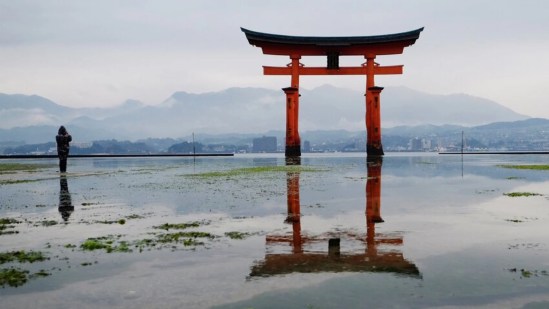My experience as a chaplain in Nagoya Prison
Marcel.lí Fonts cmf.
Chaplain of Nagoya Prison
Parish Priest of Nagoya Cathedral
I started this job at the request of the bishop of the Nagoya diocese about four years ago.
In Japan’s prisons, the prisoners’ religious needs are attended to through the Institution of Religious Assistants to Prisoners; representatives of the various religions officially recognized by the Japanese government participate in this assistance. The chaplains are representatives of the various Buddhist, Shintoist, and Christian denominations.
In Nagoya Prison, several Protestant pastors exercise this ministry. I am the only Catholic priest. The inmates who wish to participate are welcome to attend the talks I give monthly on a topic related to the Catholic religion. I am free to choose the topic I want to talk about.

In Japan, there are quite a few Latin American immigrants. A good number of the people who attend the talks I give come from those countries. However, the talks have to be in Japanese. There is always a prison official present at all the activities I do.
The average number of attendees at these talks is 10 to 20 inmates. Those who wish are also given the possibility to have a personal interview of about 30 minutes. This interview must also be conducted in Japanese, and a staff member is always present. It, therefore, lacks the privacy necessary to deal in depth with the problems of the interviewees. The relationship with the prisoners is minimal. The feedback that can be obtained from the inmates is almost nil.

As far as I know, the rules in Japanese prisons are stringent. They have practically no free time. So they always keep the inmates busy. This is to prevent conflicts from arising. But I can’t say to what extent this treatment is educational and helps reintegration into society. Sometimes I have to give some of the talks on reintegration into society shortly before leaving prison, which all the prisoners have to attend in groups.
For the prisoners, their reintegration into society must not be easy. Japanese society is a society that does not forgive those who have committed a crime or grave mistake. This is written on a person’s resume and is very difficult to erase. The main reason for this is that Japanese society values, above all else, that a person is trustworthy. If a person loses this trustworthiness, it is difficult to regain it.

That is why there is a before and an after in a prisoner’s life. Society will look at him and treat him differently just because he has been in prison.
As I say, it is difficult for me to know what worries each inmate the most and to what extent the talks I give help them personally. I try, with my talks, to provide them with a hopeful vision of life and that the experience they are living in prison helps them to grow as people. The fact that it is only one talk a month makes it challenging to give them continuity in the training that can be given. During the last two years, due to the coronavirus pandemic, some talks were also suspended. At times, the prisoners have been isolated from all contact with the outside world.

What I find most difficult in my prison ministry is the lack of personal contact with the inmates and not being able to get to know their individual situations better and thus be able to respond better to their concerns and difficulties.
The people who attend the talks are not always the same. I know that not all those who wish to attend are always able to do so. In a few cases, some of them have come to visit me after their release from prison.
As far as I have learned, in the case of foreigners, imprisonment is primarily due to drug trafficking or drug use or for having hit someone while driving under the influence of alcohol. In Japan, the rules on alcohol concerning driving are stringent and rigorous. The added problem for foreigners in prison is that when they are released, their visas are revoked, and they are forced to return to their countries of origin.

Despite the limitations I have indicated, I believe that working as a prison chaplain is a very missionary apostolate; it is in tune with the current call of the Pope and the Congregation to go and evangelize the peripheries. Prisoners are people who are marginalized by society and who need to find meaning in their lives.
The fact of having been appointed chaplain of the Nagoya prison is a challenge for me, but it is also something that helps me to feel like a Claretian missionary in Japan.
Marcel.lí Fonts cmf.
Nagoya, July 6, 2022




0 Comments